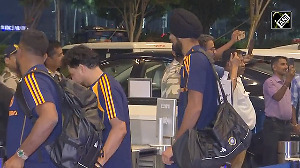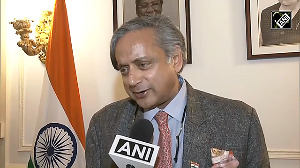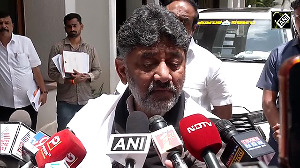India is among the countries which face the highest level of threats from terrorists. But are we geared to meet this threat? No, says Anil Chowdhry.
After a lull, terrorism has struck again, to remind us that our war against this scourge of the jihadi variety is far from over. The IED explosions which took a toll of 16 lives and wounded another 100 fits into a pattern of similar blasts carried out in the past in several cities including Hyderabad allegedly by Islamic terrorist groups in crowded public places at peak hours.
The intent behind such strikes is quite simple -- create panic, chaos and destabilise the democratic and secular Indian polity. With elements based in Pakistan enjoying a huge reservoir of resources, both material and human, openly reiterating their resolve to continue their jihadi war against India and the presence of numerous sleeper cells within our country quite frankly, we should be prepared to face similar strikes in the future too. As a matter of fact India is among the countries which face the highest level of threats from Islamic terrorists. But are we geared to meet this threat? No.
It was extremely distressing to watch events unfolding in the aftermath of the Hyderabad blasts on the electronic media. Chaos and confusion reigned at blast sites, with the public, media persons, policemen and political leaders all over the place. No effective cordon to protect the scene of crime and vital forensic evidence was visible.
Statements galore by political leaders, bureaucrats and police officers followed. Electronic media reporters and anchors were more interested in asking “who is to blame for the terrorists being able to strike with impunity -- central agencies or the local police? Was it an intelligence failure, or the failure of the police to heed intelligence inputs which had been shared with the states by central agencies? The result was the surfacing of the usual blame game between the state and central governments and the opposition and the ruling party leaders.
What was the need to bring on board, leaders of various political parties to air their reaction? How many of them have any clue how terrorists operate and how counter terrorism operations are launched? When are we going to learn to think in terms of the safety of the common man from depredations of terrorists by sinking our narrow sectarian and political differences?
In sharp contrast to this, after the devastating 9/11 attacks which shook the very fibre of the most powerful democracy in the world, President George W Bush reached out to Bill Clinton, leader of the opposition party who responded by cutting short his foreign tour to stand by the President’s side and affirm their resolve to jointly fight the challenge to their national security from Al Qaeda in every corner of the globe.
They also acted swiftly -- flew US Forces across continents to launch attacks with all their military might at their enemies in Afghanistan. They, of course, overdid it a bit and also attacked Iraq. But that is another story. I was a witness to this from close quarters as since I was posted in the Indian Embassy in Washington, DC.
Now, coming back to our own country. As someone who has been in the forefront of our attempts to tackle the menace of terrorism, here are the areas of severe gaps -- lack of political will; bipartisan approach between the Centre and states; training and equipment of the state police forces to meet the various challenges on the ground, especially in the area of high technology support systems; and the lack of security consciousness among our masses, who have to face the brunt of repeated attacks.
In my opinion here is what needs to be done:
Strengthen the intelligence gathering and counter terrorism operational capabilities of the central and state police organisations.
Intensify and sharpen the interface between central and state intelligence in Delhi, state capitals, districts down to the to the police station level.
Increase the strength of city and towns police stations as also presence of the beat constables in very locality. The beat constables, if properly trained and regularly briefed (as is done by MI5 in the UK), can provide valuable counter terrorism intelligence inputs which should be quickly acted upon.
The constitution of a National Counter Terrorism Agency with a focus on combating terrorism of every shade in all parts of the country should not be delayed any further.
Ensure participation of the community in maintaining vigil against suspicious activities by introducing effective neighbourhood watch schemes in every city and town police station.
Upgrade technology surveillance tools like CCTV cameras network, RFID tags and biometrics to secure our cities. For Delhi, the ‘Grip of Steel’ like that of the London Metropolitan Police, of which till recently even the New York police was envious, should be implemented. It is essentially a very sophisticated CCTV cameras network which enables the police control room in New Scotland Yard to monitor movement of vehicles, pedestrians and even small objects in every nook and corner of the city. Sure it’s costly. But a fool proof security system, which the capital city of the largest democracy in the world deserves, does not come cheap.
Finally, policing currently in vogue in our country needs an immediate overhaul to make it a service tuned to the safety and security needs of the common man. It should be freed from political and bureaucratic controls and made answerable only to the courts. Instead of allowing it unfettered freedom, which the police forces in our country are not yet ready to exercise judicially; its oversight should be entrusted to a body of apolitical eminent and respectable members of society.
This might read like a pipe dream, I know, but am convinced that this is the only road ahead. Let us make a beginning.
Anil Chowdhry, IPS (retd) is former secretary, internal security of the Union home ministry.









